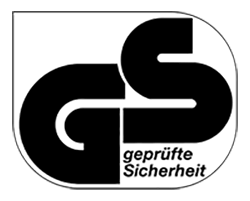

Certification Introduction
GS means "Geprufte Sicherheit" (safety certified) in German and "Germany Safety". GS certification is a voluntary certification based on the German Product Safety Law (GPGS) and tested in accordance with the European Union's unified standard EN or the German industrial standard DIN. It is a German safety certification mark recognized in the European market.
GS certification mark
The GS certification mark indicates that the safety of the product has passed the test of a credible independent agency. Although the GS certification mark is not a legal requirement, it does make the manufacturer subject to strict German (European) product safety laws when the product fails and causes an accident. Therefore, the GS certification mark is a powerful market tool, which can enhance customer confidence and purchase desire. Although GS is a German standard, most countries in Europe agree. And meet the GS certification at the same time, the product will also meet the requirements of the European Community's CE mark. Unlike CE, there is no legal requirement for the GS certification mark. However, because the safety awareness has penetrated into ordinary consumers, an electrical appliance with the GS certification mark may be more competitive than ordinary products in the market. Usually GS certified products sell at a higher unit price and are more popular.
Certification Significance
The necessity of GS certification
1. GS, as a sign of product safety and reliable quality, is more widely recognized by consumers in Germany and the EU;
2. It minimizes the manufacturer's liability risk in product quality;
3. Enhances the manufacturer's product quality, safety, Confidence in compliance with legal requirements;
4. Emphasize to consumers the obligation of manufacturers to product quality and safety;
5. Manufacturers can assure end users that products bearing the GS mark have passed the tests of third-party testing agencies;
6. In many cases, the quality and safety of products bearing the GS mark exceed the level required by law;
7. The GS mark can obtain higher recognition than the CE mark, because the GS certificate is issued by a qualified third party. Issued by a third-party testing agency.
Applicable product scope
1. Household appliances, such as refrigerators, washing machines, kitchen utensils, etc.
2. Household machinery.
3. Sports goods.
4. Household electronic equipment, such as audio-visual equipment.
5. Electrical and electronic office equipment, such as copiers, fax machines, shredders, computers, printers, etc.
6. Industrial machinery, experimental measurement equipment.
7. Other safety-related products such as bicycles, helmets, ladders, furniture, etc.
application process
1. Application: The applicant submits the documents that meet the requirements. For electrical products, the final assembly drawing, electrical schematic diagram, bill of materials, product usage or installation instructions, and differences between series models need to be submitted.
2. Sample testing: The testing will be carried out in accordance with the applicable standards and can be carried out in the manufacturer's laboratory or any laboratory of the inspection agency located in each country.
3. Factory inspection: GS certification requires safety-related procedural inspections of production sites.
4. Issue GS certificate.
Application materials
1, Application form
2, general agreement
3, product CB certificate and report
4, product instruction manual
5, parts list
6, circuit diagram and layout
7, product structure diagram
8, specifications of transformers and other components
9, Nameplate
10, Electromagnetic Compatibility Assessment Report (EMC) and Factory Declaration of Conformity (DOC)
11, German Instructions
12, Samples at the time of shipment
The difference between GS certification and CE certification
GS certification | CE certification |
Voluntary certification non-compulsory | Compulsory certification Compulsory |
Applicable to German safety regulations for testing GS | Testing according to European standards (EN) |
Tested by an independent third party authorized by the German government and issued a GS mark certificate | Self-declaration of CE is possible on the premise of having complete technical documents (including test reports) |
Must pay annual fee | No annual fee |
Annual factory inspection is required | No factory inspection required |
The GS mark is issued by an authorized testing unit, with high credibility and market acceptance | The factory's self-declaration of product conformity has low credibility and market acceptance |
It is of great help to improve the reputation of product quality | There is no way to improve product quality |
Accepted by customers in Europe | Accepted by general customers in Europe |
slightly higher cost | General fee |
Usually 6-8 weeks | Usually 2-4 weeks |